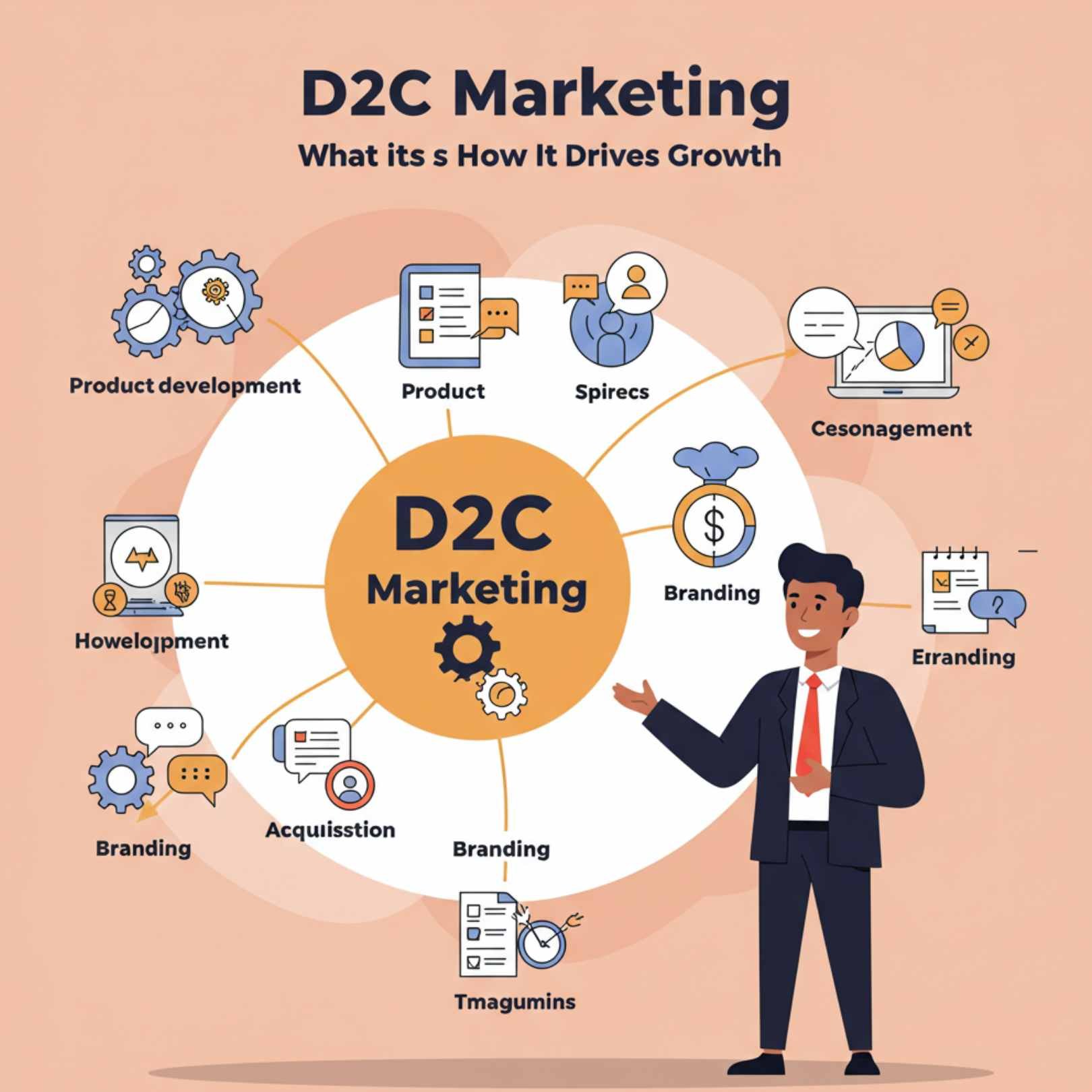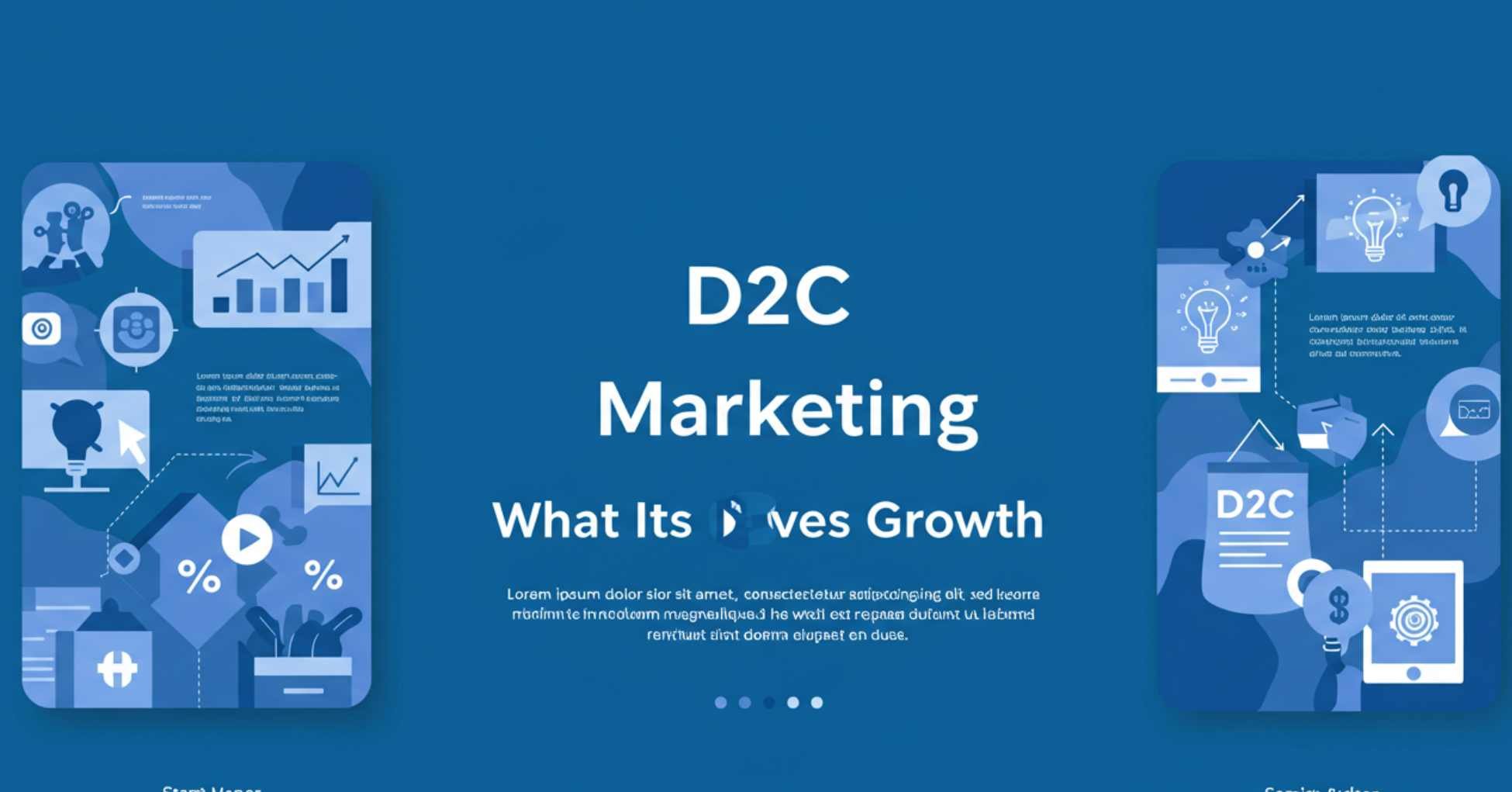D2C Marketing: What It Is and How It Drives Growth

In the past decade, Direct-to-Consumer (D2C) marketing has shifted from being a niche strategy to a mainstream model reshaping industries across the globe. Brands are increasingly cutting out the middleman, wholesalers, distributors, and retailers, to engage directly with consumers. From emerging startups like Warby Parker to established giants such as Nike, D2C marketing has enabled brands to:
-
Build stronger, more personalized customer relationships.
-
Increase control over product pricing and branding.
-
Leverage first-party data to make smarter business decisions.
With the rapid growth of e-commerce and changing consumer expectations, D2C has become a game-changer in the marketing world.
What is D2C Marketing?
D2C marketing refers to a business model where companies sell products directly to consumers, bypassing traditional retail channels. This model offers companies more control over:
-
Customer Experience: Brands can ensure consistent messaging, pricing, and customer service.
-
Data: Direct access to first-party data helps brands make informed decisions.
-
Margins: Cutting out the middleman allows brands to retain a larger share of revenue.
Key Benefits of D2C Marketing
1. Stronger Customer Relationships
-
Personalization: Brands can tailor their offerings to individual customers based on preferences and past behaviors.
-
Loyalty Programs: D2C companies often offer incentives for repeat customers, creating stronger bonds.
-
Direct Communication: Through email marketing, live chats, and social media, brands can engage with their audience in real-time.
2. Data-Driven Insights for Smarter Marketing
D2C brands have access to consumer data that traditional retail models often lack. With this information, businesses can:
-
Refine their product offerings based on customer preferences.
-
Run A/B tests to see what marketing strategies resonate best.
-
Optimize campaigns for maximum engagement and ROI.
3. Higher Profit Margins
Without relying on third-party distributors, D2C brands can:
-
Lower costs by cutting out the middleman.
-
Reinvest savings into areas like product innovation, marketing, or improving customer support.

Content Creation and Automation Tools for D2C Success
Content creation plays a pivotal role in building a strong D2C brand. Today, many D2C brands rely on content generation platforms like Kafkai to streamline their marketing efforts. Here's how platforms like Kafkai can enhance D2C marketing:
- AI-Driven Strategy and SEO-Focused Content Creation: Kafkai uses advanced keyword analysis and competitor insights to deliver proven SEO strategies that drive higher rankings. This helps businesses streamline their content creation process while ensuring it’s optimized to rank higher on search engines. By automating content generation, brands can consistently create SEO-optimized articles, blogs, and product descriptions that attract organic traffic.
- Faster Content Production: With Kafkai’s automated writing tools, businesses can produce high-quality content in a fraction of the time, allowing marketing teams to focus on other strategic initiatives.
Key D2C Strategies for Success
1. Building an Exceptional Online Experience
-
Mobile Optimization: With most consumers shopping on their phones, a mobile-optimized website is a must.
-
Fast Page Loads: Slow websites lead to high bounce rates, which impact conversion rates.
-
Seamless Navigation: An easy-to-use website improves the chances of turning a visitor into a customer.
2. Social Media & Influencer Marketing
-
Influencer Partnerships: Collaborating with influencers helps build credibility and trust.
-
Targeted Ads: Ads on platforms like Instagram and Facebook can be tailored to specific customer segments.
-
Engagement: Brands can engage with customers through live streams, polls, and interactive content.
3. Personalizing the Customer Journey
-
AI-Powered Recommendations: Tools like machine learning algorithms help recommend products that customers are most likely to purchase.
-
Automated Email Campaigns: Follow-up emails with personalized offers can increase conversions.
-
Real-Time Support: Chatbots and AI-driven customer service tools ensure customers get the help they need 24/7.

The Future of D2C Marketing
As D2C marketing continues to evolve, several trends will define the future:
-
AI and Automation: From personalized product recommendations to customer service, AI is driving D2C marketing’s future.
-
Sustainability: Brands that focus on sustainability will attract eco-conscious consumers who prioritize ethical business practices.
-
Augmented Reality (AR): AR will revolutionize the online shopping experience, allowing customers to “try before they buy” from the comfort of their own homes.
Challenges in D2C Marketing
While D2C marketing offers substantial benefits, there are challenges that businesses must address to succeed:
| Challenge | Solution |
|---|---|
| Fulfillment & Logistics | Partner with reliable 3PL providers and use automation tools for inventory management. |
| Customer Acquisition | Focus on offering exceptional customer service and creating a personalized, engaging experience. |
| Brand Differentiation | Create unique branding and high-quality products to stand out in a competitive market. |
Conclusion: Embrace the D2C Revolution
D2C marketing is not just a passing trend; it’s a shift in how businesses engage with customers. By adopting a D2C strategy, brands can build stronger customer relationships, increase profitability, and create more personalized experiences. The key is to focus on data-driven insights, optimize the customer journey, and embrace the latest technologies, including content creation tools like Kafkai to streamline the content creation process.
FAQs
1. What industries are best suited for D2C marketing?
- Apparel, beauty, fitness, and home goods are some of the most successful industries in the D2C space.
2. How does D2C affect traditional retail?
- D2C has forced many traditional retailers to innovate and adopt hybrid models that combine both D2C and retail partnerships.
3. How important is content marketing for D2C brands?
- Content marketing is essential for building brand trust, educating customers, and driving engagement through blog posts, social media, and videos.
4. Can small businesses succeed in D2C?
- Yes, by focusing on niche markets and offering hyper-personalized service, small businesses can compete with larger brands.
5. What metrics should D2C brands track?
- Key metrics include Customer Acquisition Cost (CAC), Customer Lifetime Value (CLTV), conversion rates, and retention rates.